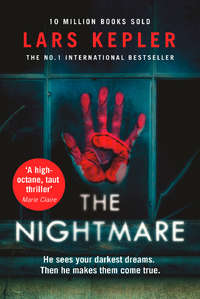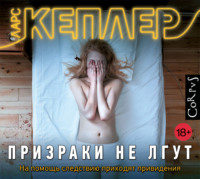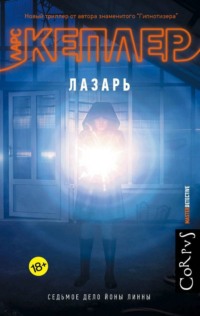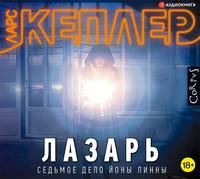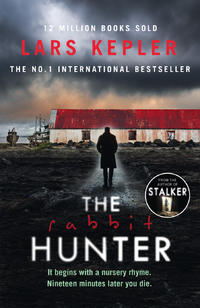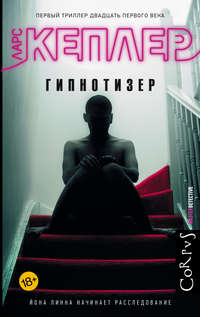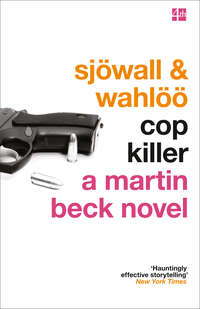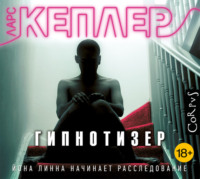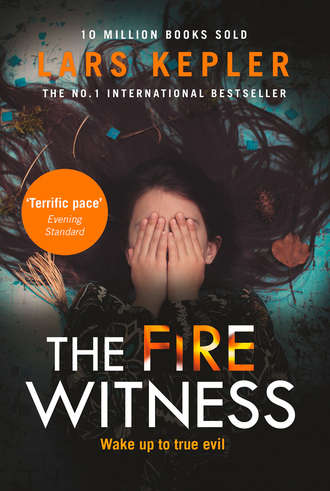
Полная версия
The Fire Witness
She tries to breathe calmly.
She gently leans the handle of the mop against the wall, but waits until she hears her aunt laugh at something on television, before picking up the photograph.
The ornate brass key is hanging from the back of the frame. Flora removes it from its hook, but her hands are shaking so much she drops it.
It hits the floor with a tinkle and bounces under the bed.
Flora has to reach out for support as she bends down.
She hears footsteps in the passageway, and lies still and waits. Her pulse is throbbing in her temples.
The floor outside the door creaks, then everything is quiet again.
The key is nestled among the dusty cables by the wall. She reaches in and picks it up, then gets to her feet and waits a few seconds before walking over to the bureau. She unlocks it, folds the heavy lid down, and pulls out one of the small drawers. Beneath the postcards from Paris and Mallorca is the envelope where Ewa keeps the money for the regular expenses. Flora opens the envelope containing the money for next month’s bills, and takes half of it, puts the notes in her pocket, quickly puts the envelope back, and tries to slide the little drawer back in, but there’s something stopping it.
‘Flora,’ Ewa calls.
She pulls out the drawer again, but can’t see anything odd, and tries again, but her hands are shaking too much now.
She hears footsteps in the passageway again.
Flora pushes the drawer. It’s slightly crooked, but it goes in, reluctantly. She closes the bureau but doesn’t have time to lock it.
The door to her aunt’s bedroom opens, hitting the bucket so hard that water sloshes out.
‘Flora?’
She grabs the mop, mumbles something, and moves the bucket. She mops the spilled water, then carries on with the floor.
‘I can’t find my hand cream,’ Ewa says.
There’s a suspicious look in her eyes, and the wrinkles around her unhappy mouth are deeper than usual. She walks barefoot across the newly cleaned floor. Her yellow sweatpants are sagging and her white T-shirt is stretched tightly across her stomach and large bust.
‘It … Maybe it’s in the bathroom cabinet, I think that’s where it is, next to the hair lotion,’ Flora says, rinsing the mop again.
There’s an advertising break on television, the volume is louder, and shrill voices are talking about athlete’s foot. Ewa stops in the doorway and looks at her.
‘Hans-Gunnar doesn’t like the coffee,’ she says.
‘I’m sorry about that.’
Flora squeezes out the excess water.
‘He says you’re refilling the packet with cheaper stuff.’
‘Why would I—’
‘Don’t lie,’ Ewa snaps.
‘I’m not,’ Flora mumbles, and carries on mopping the floor.
‘Well, you know you’re going to have to go and get his cup, wash it up, and make some fresh coffee.’
Flora stops mopping the floor, leans the handle against the door, apologises, and goes into the living room. She can feel the key and money in her pocket. Hans-Gunnar doesn’t even look at her when she picks up his cup next to the plate of biscuits.
‘For fuck’s sake, Ewa,’ he cries. ‘It’s starting again!’
His voice makes Flora jump, and she hurries out. She passes Ewa in the hall, and catches her eye.
‘Do you remember that I have to go on that jobseekers’ course this evening?’ Flora says.
‘You still won’t get a job.’
‘No, but I have to go, it’s the rules … I’ll make some fresh coffee and try to finish the floor … then maybe I can get the curtains done tomorrow.’
34
Flora pays the man in the grey coat. Water drips onto her face from his umbrella. He gives her the door key and tells her to leave it in the antique shop’s letterbox as usual when she’s finished.
Flora thanks him and hurries on along the pavement. The seams in her old coat have started to come loose. She’s forty years old, but her girlish face radiates loneliness.
The first block of Upplandsgatan closest to Odenplan is full of antique and curiosity shops. Their windows are full of chandeliers and glass-fronted cabinets, old tin toys, porcelain dolls, medals, and clocks.
Beside the mesh-covered door to Carlén Antiques is a narrower door leading to a small basement. Flora tapes a sheet of white paper to the dimpled glass.
SPIRITUALIST EVENING
A steep flight of steps leads down to the basement, where the pipes roar whenever someone above flushes a toilet or runs the taps. Flora has rented the room seven times to hold seances. She’s had between four and six participants each time, which only just covers the cost of hiring the room. She’s contacted a number of newspapers to see if they’d like to write about her ability to talk to the dead, but hasn’t had any response. In advance of this evening’s seance, she placed a larger advert in the new-age journal Phenomena.
Flora only has a few minutes before the participants arrive, but she knows what she has to do. She quickly moves the furniture and arranges twelve chairs in a circle.
On the table in the middle, she places the doll’s house figures in nineteenth-century costume. A man and a woman with tiny, shiny porcelain faces. The idea is that they should help conjure up a sense of the past. Immediately after the seances, she hides them away again in the fuse-box, because she doesn’t really like them.
She places twelve tea-lights in a circle around the dolls. She pushes some strontium chloride into the wax in one of the candles with a matchstick, then conceals the hole.
She hurries over to the dresser to set the alarm on the old clock. She tried that four sessions ago. The clapper is missing, so the only noise is a dry hacking sound from the cupboard. But, before she has time to wind the mechanism, the door opens from the street. The first participants are here. She hears umbrellas being shaken, then footsteps on the stairs.
Flora happens to see her own reflection in the rectangular mirror on the wall. She stops, takes a deep breath, and runs her hand across the grey dress she bought from the Salvation Army.
When she smiles, she instantly looks much calmer.
She lights some incense, then says hello quietly to Dina and Asker Sibelius. They hang up their coats and talk in subdued voices.
The participants are almost all old people who know they’re approaching death. They’re people who can’t bear what they’ve lost, who can’t accept the idea that death might be absolute.
The front door opens again and someone comes down the steps. It’s an elderly couple she hasn’t seen before.
‘Welcome,’ she says in a low voice.
Just as she’s about to turn away, she stops and looks at the man as if she’s seen something unusual, then pretends to shake off the feeling, and asks them to take a seat.
The door opens again and more participants arrive.
At ten past seven she has to accept that no one else is coming. Nine is still the most so far, but still too few for her to be able to replace the money she’s borrowed from Ewa.
Flora tries to breathe calmly, but can feel her legs trembling as she returns to the large, windowless room. The participants are already sitting in a circle. They stop talking, and all eyes turn to look at her.
35
Flora Hansen lights the candles on the tray, and only when she’s taken her seat does she allow herself to look around at the participants. She’s seen five of them before, but the others are all new. Opposite her is a man who looks only thirty years old or so. His face is open and handsome in a boyish way.
‘Welcome, all of you,’ she says, and swallows hard. ‘I think we should start at once …’
‘Yes,’ old Asker says in his creaking, friendly voice.
‘Take hold of each other’s hands to form the circle,’ Flora says warmly.
The young man is looking straight at her. The look in his eyes is smiling and curious. A sense of excitement and expectation begins to flutter in Flora’s stomach.
The silence that settles is black and imposing, ten people forming a circle and simultaneously feeling the dead gathering behind their backs.
‘Don’t break the circle,’ she tells the group sternly. ‘Don’t break the circle, no matter what happens. That could mean that our visitors are unable to find their way back to the other side.’
Her guests are usually so old that they have lost far more people to death than they still have alive. For them death is a place full of familiar faces.
‘You must never ask about the time of your own death,’ Flora says. ‘And you must never ask about the devil.’
‘Why not?’ the young man asks with a smile.
‘Not all spirits are good, and the circle is only a portal to the other side …’
The young man’s dark eyes glint.
‘Demons?’ he asks.
‘I don’t believe that,’ Dina Sibelius smiles anxiously.
‘I try to guard the portal,’ Flora says seriously. ‘But they … they can feel our warmth, they can see the candles burning.’
The room falls silent again. There’s an odd, agitated buzzing sound, like a fly caught in a spider’s web.
‘Are you ready?’ she asks slowly.
The participants mumble affirmatively, and Flora feels a shiver of pleasure when she realises that there’s a whole new level of concentration in the room. She imagines she can hear their hearts beating, feel their pulses throbbing in the circle.
‘I’m going to go into a trance now.’
Flora holds her breath and squeezes Asker Sibelius’s and the new woman’s hands. She shuts her eyes tightly, waits as long as she can, fights the instinct to breathe until she starts to shake, and then she inhales.
‘We have so many visitors from the other side,’ Flora says, after a pause.
Those who have been here before murmur supportively.
Flora can feel the young man looking at her, she can sense his alert, interested gaze on her cheeks, her hair, her neck.
She lowers her face and decides to start with Violet, to help convince the young man. Flora knows her background, but has made her wait. Violet Larsen is a terribly lonely person. She lost her only son fifty years ago. One evening the boy fell ill with meningitis, and no hospital would take him for fear of spreading the infection. Violet’s husband drove the sick boy from hospital to hospital all night. When morning came his son died in his arms. The father was overcome by grief and died just a year later. One fateful night all her happiness died. Since then, Violet has been a childless widow. She has lived like that for half a century.
‘Violet,’ Flora whispers.
The old woman turns her moist eyes towards her.
‘Yes?’
‘There’s a child here, a child who’s holding a man by the hand.’
‘What are their names?’ Violet asks in a tremulous voice.
‘Their names … the boy says you used to call him Jusse.’
Violet lets out a gasp.
‘It’s my little Jusse,’ she whispers.
‘And the man, he says you know who he is, you’re his little flower.’
Violet nods and smiles.
‘That’s my Albert.’
‘They have a message for you, Violet,’ Flora goes on seriously. ‘They say they’re with you every day, every night, and that you’re never alone.’
A large tear trickles down Violet’s wrinkled cheek.
‘The boy is telling you not to be sad. Mummy, he says, I’m fine. Daddy’s with me all the time.’
‘I miss you so much,’ Violet sniffs.
‘I can see the boy, he’s standing right next to you, touching your cheek,’ Flora whispers.
Violet is sobbing gently, and the room falls silent again. Flora waits for the heat of the candle to ignite the strontium chloride, but it takes a while.
She murmurs to herself and thinks about who to pick next. She closes her eyes and rocks back and forth slightly.
‘There are so many here …’ she mutters. ‘There are so many … They’re crowded at the narrow portal, I can feel their presence, they miss you, they’re longing to talk to you …’
She falls silent as one of the candles on the tray starts to crackle.
‘Don’t squabble at the portal,’ she mumbles.
The crackling candle suddenly flares bright red, and one member of the circle lets out a little scream.
‘You haven’t been invited, wait outside,’ Flora says sternly, and waits until the red flame has gone. ‘I want to speak to the man in the glasses,’ she murmurs. ‘Yes, come closer. What’s your name?’
She listens.
‘You want it the way you usually have it,’ Flora says, looking up at the group. ‘He says he wants it the way he usually has it. Exactly as usual, with faggots and boiled potatoes and …’
‘That’s my Stig!’ the woman next to Flora exclaims.
‘It’s hard to hear what he’s saying,’ Flora goes on. ‘There are so many here, they keep interrupting him.’
‘Stig,’ the woman whispers.
‘He says he’s sorry … he wants you to forgive him.’
Through the hand she’s holding, Flora can feel the old woman shaking.
‘I’ve forgiven you,’ the old woman whispers.
36
After the seance is over Flora takes a very measured farewell. She knows that people usually want to be alone with their fantasies and memories.
She goes around the room slowly, blowing out the candles and rearranging the chairs. She can still feel a lingering satisfaction in her body from everything having gone so well.
She’s left a box in the hall for the participants to leave their money in. She counts it and confirms that it isn’t enough to pay back what she borrowed from Ewa’s envelope. Next week she’s got another spiritualist evening, and that’s her last chance to earn the money back without being found out.
Despite the fact that she advertised in Phenomena, there still weren’t enough participants. She’s started waking up at night, staring dry-eyed into the darkness wondering what on earth she’s going to do. Ewa usually pays the bills at the start of each month, and that’s when she’s going to realise that some of the money’s missing.
The rain has stopped by the time she emerges into the street. The sky is black. Streetlamps and neon signs shimmer in the wet tarmac. Flora locks the door and drops the key through the letterbox of Carlén Antiques.
Just as she is removing the paper sign and putting it in her bag, she notices that there’s someone standing in the next doorway. It’s the young man from the seance. He takes a step towards her and smiles apologetically.
‘Hi, I was wondering … can I offer you a glass of wine somewhere?’
‘I can’t,’ she says with instinctive shyness.
‘You’re really great,’ he says.
Flora doesn’t know what to say, she can feel her face getting redder and redder the longer he looks at her.
‘It’s just that I’m going to Paris,’ she lies.
‘No time for me to ask a few questions?’
Now she realises that he must be a journalist from one of the newspapers she’s been trying to contact.
‘I’m leaving first thing tomorrow morning,’ she says.
‘Give me half an hour – can you manage that?’
As they hurry across the street to the nearest bistro, the young man tells her that his name is Julian Borg, and that he writes for the magazine Close.
A few minutes later Flora is sitting opposite him at a table covered by a white paper cloth. She takes a careful sip of the red wine. Sweet and sour blend in her mouth, and warmth spreads through her body. Julian Borg picks at a Caesar salad as he looks at her curiously.
‘How did this start?’ he asks. ‘Have you always seen spirits?’
‘When I was little I thought everyone could, it didn’t seem at all odd to me,’ she says, blushing because the lies come so easily.
‘What did you see?’
‘People I didn’t know seemed to live with us … I just thought they were lonely people … and sometimes a child would come into my room and I’d try to play with her …’
‘Did you tell your parents?’
‘I learned very early to keep quiet,’ Flora says, taking another sip of the wine. ‘It’s only fairly recently that I’ve realised that a lot of people actually need the spirits, even if they can’t see them … and the spirits need people. I’ve finally found my purpose … I stand in the middle and help them to connect.’
She looks into Julian Borg’s warm eyes for a few moments.
In fact it all started when Flora lost her job as an auxiliary nurse. She saw less and less of her old workmates, and in just one year she had lost touch with all her friends. When Flora’s unemployment benefit ran out, she had to move back in with Ewa and Hans-Gunnar.
The job centre helped her get onto a course to become a nail technician, where she got to know one of the other participants, Jadranka from Slovakia. Jadranka went through low patches, but when she was feeling better she used to earn extra money by taking calls on a webpage called the Tarot Hotline.
They started to socialise, and Jadranka took Flora to a big seance held by the Society of Truth Seekers. Afterwards they talked about how it could be done much better, and just a few months later they found the basement room on Upplandsgatan. After two seances, Jadranka’s depression got worse, and she was admitted to a clinic south of Stockholm. But Flora carried on holding the seances on her own.
She borrowed books from the library about healing, past lives, angels, auras, and astral bodies. She read about the Fox sisters, about the cabinet of mirrors, and Uri Geller, but the person she learned most from was the sceptic James Randi’s attempts to uncover deceptions and tricks.
Flora has never seen any spirits or ghosts, but she’s realised that she’s good at saying the things people are desperate to hear.
‘You use the word spirits rather than ghosts,’ Julian says, putting his knife and fork together on the plate.
‘They’re the same thing,’ she replies. ‘But ghosts sound unpleasant and negative.’
Julian smiles, and there’s a disarming honesty in his eyes when he says: ‘I have to confess … I have a lot of trouble believing in spirits, but …’
‘You just need to be open-minded,’ Flora explains. ‘Conan Doyle, for instance, he was a spiritualist … you know, the guy who wrote all those books about Sherlock Holmes …’
‘Have you ever helped the police?’
‘No, that …’
Flora blushes hard and doesn’t know what to say, and looks at her watch.
‘Sorry, you need to go,’ he says, and takes hold of her hands across the table. ‘I just want to say that I can tell you want to help people, and I think that’s a good thing.’
His touch makes Flora’s heart beat faster. She daren’t meet his gaze again until he lets go, and they go their separate ways.
37
The red buildings that make up the Birgitta Home look idyllic in daylight. Joona is standing beside a huge silver birch talking to prosecutor Susanne Öst. Raindrops sparkle in the air as they fall from the branches.
‘The police are still knocking on doors in Indal,’ the prosecutor says. ‘Someone drove into a traffic light, and there’s a load of broken glass on the ground, but apart from that … nothing.’
‘I need to talk to the girls again,’ Joona says, thinking about the violence that played out inside the misted windows of the main building.
‘I thought this business with Dennis would give us something,’ Susanne says.
Joona thinks about the isolation room, and is seized by an unsettling suspicion. He tries to picture the sequence of brutal events, but can only make out shadows between the furniture. People’s figures are transparent, like dusty glass, fluid, almost impossible to see.
He takes a deep breath, and suddenly the room where Miranda is lying with her hands over her face becomes perfectly clear. He can see the force behind the cascade of blood, the heavy blows. He can identify every impact, and sees how the angle changes after the third blow. The lamp starts to swing. Miranda’s body is covered with blood.
‘But there was no blood on her,’ he whispers.
‘What are you saying now?’ the prosecutor whispers.
‘I just need to check something,’ Joona says as the door to the main building opens and a small man in tight protective clothing comes out.
He’s Holger Jalmert, a professor of forensic science at Umeå University. He slowly removes his mask, to reveal a very sweaty face.
‘I’ll arrange an interview with the girls at the hotel in an hour,’ Susanne says.
‘Thanks,’ Joona says, walking across the yard.
The professor is standing beside his van as he removes the protective clothing, places it in a rubbish bag and seals it carefully.
‘The duvet’s missing,’ Joona says.
‘So I finally get to meet Joona Linna,’ the professor says, opening a fresh set of disposable overalls.
‘Have you been in Miranda’s room?’
‘Yes, I’m finished in there.’
‘There was no duvet.’
Holger stops with a frown.
‘No, you’re right about that.’
‘Vicky must have hidden Miranda’s duvet in the wardrobe or under the bed in her own room,’ Joona says.
‘I’m just about to start in there,’ but Joona is already on his way towards the building.
The professor watches him go, and can’t help thinking about what he’s heard about Joona Linna: that he’s so determined that he can stand and stare at a crime scene until it opens up like a book.
He puts the bag down, then hurries after the detective superintendent, clutching the overalls.
They put the protective outfits on, the shoe covers and latex gloves, before they open the door to Vicky’s bedroom.
‘There’s something under the bed,’ Joona confirms.
‘One thing at a time,’ Holger murmurs, and puts a mask on.
Joona waits in the doorway while the professor photographs and measures the room with a laser so that he can locate anything he finds using a three-dimensional set of coordinates.
On the wall above the ornate Bible passages there’s a poster of Robert Pattinson, with his pale face and dark eyeshadow, and there’s a large bowl full of white plastic security tags from H&M on a shelf.
Joona watches Holger as he systematically covers the floor with foil, presses it down with a roller, then lifts it gently before photographing and packing it away. He moves slowly from the door to the bed, then across towards the window. As he lifts the foil from the floor, the imprint of a trainer is clearly visible on the layer of yellow gelatine.
‘I need to go soon,’ Joona says.
‘But you’d like me to look under the bed first?’
Holger shakes his head at Joona’s impatience, but carefully spreads a layer of plastic on the floor beside the bed. He kneels down and reaches one hand beneath the bed and takes hold of the object under there.
‘It feels like a duvet,’ he says, concentrating.
He carefully pulls the heavy duvet out onto the plastic. It’s been twisted up, and is drenched in blood.
‘I think Miranda had it around her shoulders when she was murdered,’ Joona says in a low voice.
Harry folds the plastic over, then pulls a large sack over the wrapped duvet. Joona looks at his watch. He can stay another ten minutes. Holger goes on taking more samples. He uses moist cotton-buds on the dried blood, then lets them dry out before packing them.
‘If you find anything that relates to either a person or a location, you must call me at once,’ Joona says.
‘Understood.’
For the hammer under the pillow the professor uses one hundred and twenty cotton-buds, which he wraps and labels individually. He collects strands of hair and textile fibres on adhesive plastic, wraps loose hairs in paper, and puts tissue samples and fragments of bone in test tubes so they can be chilled to prevent the growth of bacteria.
38
The conference room at the Hotel Ibis is busy, and Joona waits in the breakfast room while the prosecutor talks to the anxious staff about another room for the interviews. A television screen is shimmering from a metal frame near the ceiling.




